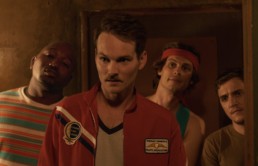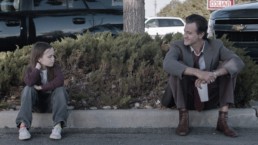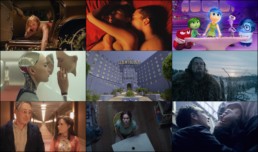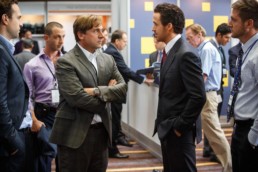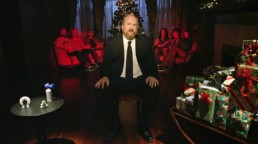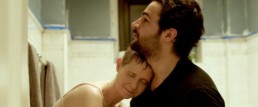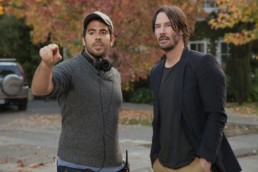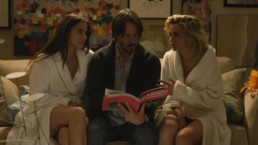Review: 'Band of Robbers'
This review initially ran on June 19, 2015
Classic characters from perhaps the greatest literary work of American literature, Huckleberry Finn and Tom Sawyer have hit the big screen, in a re-imagining that takes their mischievously-intentioned, hero-of-the-story selves, keeps a driving plot about finding a mythic treasure, and leaves the rest behind – and to good-spirited, well-earned fun in the new film, Band of Robbers.
This timeless twosome, trouble-making in their never-ending pursuit of adventure and hero-seeking recognition and glory, are leveraged here as modern-day treasure seekers, that unite with their trusted merry men in hatching a plan of finding the first clue to the treasure, which first leads them to hold up a pawn shop in plastic grocery bag masks and the escort of "A Mexican." The fun that is had here is in feeling the familiarity of these good ol' boys that live so canonically in culture, and giving them the slick young people's comedic treatment, working off a fine-tuned script and the work of a stellar cast to make for a worthwhile, enjoyable time.
It should be stated early, there's not a whole lot that Robbers truly, truly, lifts from Mark Twain's classic novel or characters other than using the characters' likeliness and winning charms to drop them into this new culture mash-up. It's really just the story of a version of a Huck Finn (Kyle Gallner) and a Tom Sawyer (Adam Nee), where Huck is a recent prison release looking to make clean and Tom is a wily cop whose adventure-seeking ways leads to his character's charming but still law-skirting flirtations, and through this all, they still remain the best of friends, along with a band of other self-affirmed misfit pirate pals.
With nods and instances of looking to weigh itself within the framework of a more classically told story of timeless fashion (to which the film succeeds in operating in this dually opposing mindset), the film is broken up into chapters, black cards with white hand-written scrawl of chapter titles and subtitles that bookend each section of the film to add the intentional, necessary rooting of seriousness before thrusting into the shenanigan-laden episodes that follow.
There's a streak of folksy, whimsy appeal here, which, with the feeling of it being a home-grown indie effort of true charm, along with its premise of a tight-knit group of friends on a headstrong crime spree of a less-than-thought-out scheme, most closely resembles Wes Anderson's winning feature debut, Bottle Rocket (1996). The difference is that it's entirely obvious that everyone here is looking to make themselves into a goofball for a good time, and audiences should find themselves laughing at the number of laugh out loud jokes offered here. When Tom wrangles "the band" back together, after Huck's first day out of the clink (for an unspecified, non-violent crime) and reveals a plan to steal the fabled treasure of Injun Joe, right off the bat, his monologuing is met with raised eyebrows and wry confusions, setting up the level of competency of all involved. The pact is legitimized by – you guessed it – a blood oath (though they compromise in not spilling any actual blood, in this secret meeting at Tommy Barnes' poker table in his "man cave").
The faces and talents enlisted here are truly where the comedy shines. It has the taste of 21 Jump Street comic-firing and timing of every-line-a-joke (and mostly bulls eye's at that), uses some familiar faces and some not-so, in playing a winning hand. Kyle Gallner as Huck is a Jeremy Renner and Rick Grimes a la The Walking Dead, where Adam Nee is as much as stand-out in a role that he knows so well. The geek-beloved Matthew Gray Gubler as Joe Harper, along with Hannibal Burress as Ben Rogers add a deep bench to the effort, with Burress (and "Greg...Knife" nailing every one of his scenes). Melissa Benoist and Eric Christian Olsen also star as little-used Becky Thatcher, Tom's new partner on the day of the planned heist (mention heist) and Sid Sawyer, beloved detective who plays it maybe a bit too straight.
Stephen Lang as Injun Joe (don't worry, in case you forgot, "Injun Joe" was written by Twain as a half Native American, half white man) also adds a villain to fear after, with a gray wig and cowhide jacket with tassels. Though a discomforting laugh is had in light of today's events with ex-NAACP chapter leader Rachel Dolezal when Injun Joe says, "How is it racist to want to be more like another race?" Other than that, Robbers addresses racial tension ingrained in the original text by shifting to the plight of the Latino, as Huck finds a heartfelt cause in defending Jorge Jimenez (Daniel Edward Mora) after he gets the gardener involved in a heist that lands him on the brink of deportation.
Written and directed by brother filmmaking team Aaron and Adam Nee, Robbers went through many years of development (including an idea of it being a TV show) before finally having its world premiere at the LA Film Festival. One wonders what following that version of Huck, Tom, and company may have been like, and what many adventures they may have spun in and out of in sit-com fashion. But its final format of a ninety-five-minute feature film feels like the best use of its talent, sparing any over-indulgence in what could have flopped as a gimmick and succeeds as a send-up that breathes fresh life into an American classic.
Correction: This review was edited from a previous version that misstated the ethnicity of 'Injun Joe'.
Band of Robbers had its World Premiere on Saturday, June 13th, at the LA Film Festival. Info here.
Review: 'Lamb'
Despite its innocently named title, Lamb is difficult watching, perhaps even among the more uncomfortable movies I can ever remember seeing, as it struggles to tackle heavy subject matter that's considered more than politically incorrect.
Lamb is the story of David Lamb (Ross Partridge), a forty-seven-year-old divorcee with slicked-back hair but emotionally empty, apathetic to an ending marriage, father of failing health, and life in general in his deadbeat town. Lamb is approached by an eleven-year-old girl, Tommie (Oona Laurence), who Lamb sees and recognizes as a helpless soul, one who needs his help, and proposes a road trip that the two embark on.
While Lamb forces the viewer to confront discomforting, disturbing, social realities between adults and minors, the film feels mostly insufferable in how it can never justify the situation that puts these two people together to attempt to ask any questions except for how unwarranted and inappropriate the relationship is.
This is the complex area that the film never self-assuredly nails–is David Lamb correct in taking an eleven-year-old girl on the road, or is the entire act inappropriate and wrong? The fact that the movie attempts to walk both sides of the line, and seemingly wish to show a justified relationship between them makes the film too difficult a watch to get on board with.
Lamb is the product of being a novel written by Bonnie Nadzam, and being adapted here by Ross Partridge, who wrote the screenplay, directed, and stars as the titular character. Partridge's attempt at adapting, while courageous in its artistic leap, also feels like a miscalculation of what the movie should be about–or rather, who; Tommie should be our protagonist, but instead we see this film as a means of featuring the fulfilling of David Lamb.
Partridge's Lamb is emotionally unavailable, dealing with whatever difficulties he must take on, and sees a counterpart only in Tommie and her fractured family life. The fact that David sees her as a justified and mature person to satisfy his insecurities and emotional stunting only shows his character's own shortcomings and weaknesses. It's enough to raise interesting questions, but trust me, you'll cringe through it all.
Credit Lamb for not falling on its sword any more than it has by the performance and acting talent of, who should be considered the true lamb of this movie, Oona Laurence. Last seen in Southpaw as well as I Smile Back, Laurence is game and skilled enough to be a strong presence next to her much older captor and self-proclaimed guardian.
While Lamb should be in some part applauded for even attempting to tell such a risky, emotionally vulnerable story, the film still feels like an uncomfortable story that doesn't push boundaries as much as reinforce what makes a story like this wrong for a lot of reasons.
Lamb is now playing at select theaters and iTunes/VOD January 12, 2016.
Ryan's Top 10 Films of 2015
What we consider to be the best of this year represents a combination of the movies that had the greatest emotional impact on us, matched with movies that felt innovative or groundbreaking. Here are the films Ryan considers to be this year’s best:
10. Going Clear: Scientology and the Prison of Belief
The only other documentary on this list is awarded to another HBO-distributed film and made with even greater impress. What makes Going Clear: Scientology and the Prison of Belief even greater than the film itself is the fact that it even exists in the first place. Director Alex Gibney (Enron: The Smartest Guys in the Room) took the film to Sundance this year, unsure if it would even screen due to its controversial subject matter and the people in high positions it could expose– and worried they should have been. Gibney fearlessly peels back the curtain on the religion that is still largely considered a mystery and misunderstood. But beyond revealing the incredulous story behind religion and its founder, L. Ron Hubbard himself, Gibney goes on to show what deeper and darker moments that affect all associated with it in a shocking way. It's the one film that left me feeling amazed at what real-world injustices are happening behind closed doors.
9. Victoria
Victoria most likely won't be on a lot of readers' radars, which is unfortunate for this small Berlin-set movie. If only more audiences knew that this heist-film was shot in a single, uninterrupted take, then maybe people would have been drawn in. Beyond that, however, is a story that supersedes its camera trickery. Victoria, on one late night out, is herself drawn into an unfamiliar world of new friends when Berliners make her acquaintance, eventually befriending the girl who is in turn involved in a bank robbery. The single take never gives the audience a moment to relax, which makes the whole thing an even greater movie-watching experience. When the sun finally rises in this incredible movie, it leaves the watcher feeling amazed at what all just took place in one real, single night.
8. Room
I first heard about 'Room' when I saw the hardcover book a few years back on my mom's bedside dresser. I was familiar with what the story was, about a mother and son being held hostage in a backyard shed for many years, and was intrigued at what its eventual movie adaptation would portray it as. Director Lenny Abrahamson (Frank), along with the novel's author and screenwriter Emma Donoghue, bring an incredible vision to the big screen, focusing the story of these hostages not on the single aspect of harrowing survival, but rather the shared, singular connection between that of mother and son, played by pitch-perfect Brie Larson and young marvel Jacob Tremblay. Room succeeds as a moving love story by mining the most unique and visceral moments in the place both characters only call "Room," to show a reality that can only exist when love is at the center of it. Incredibly directed and acted, there are more than a few sequences that had me arrested in seeing these new worlds for the first time, making this one of the most successful novel-adaptations of this or any year.
7. Love
Gaspar Noe's (Enter the Void) latest film is certainly not for everyone. In fact, it's probably one of the most singularly divisive films of this or any year, due to its incredibly graphic subject matter. Love, the story of two young art-school students, one American and the other Parisian, is the story of heartbreak. Love alternates between past and future events to show every corner of what feels like one of the most authentic relationships captured on screen. Now, the hook here, of course, is that real-life sex scenes link these scenes together–non-staged, non-faked, real-life intercourse. Admittedly, knowing this before going into the movie, I thought that these scenes were only going to be included for the spectacle of it, but what I soon realized was that Love was in fact, a love-story. It was all held together by moving performances and storytelling, making the scenes feel less pornographic and more artfully composed and honest. This movie is for those that are fearless in finding out that all of these moments together make a story that is beautiful, heartbreaking, and boundary-pushing.
6. It Follows
Personally, I don't much prefer watching scary movies. I'll specify this by caveating, that I don't much prefer to watch this new brand of today's scary movies, which are all either entirely built on empty silence/loud-noise moments or of the tasteless torture porn variety. So leave it to It Follows to shake me out of my scary-movie snootiness, and scare me to the core, with it's incredible take on what makes scary movies scary: suspense. With its dry yet direct title, this throwback to 80s-style scary movies punches up suspense more than anything I saw this year, as uninterrupted long takes, seeing out-of-focus characters slowly walk into the foreground, and other great moments, make this simple set-up, about a curse passed on from teen to teen, one that had me breathless and amazed. This is what scary is supposed to feel like.
5. Me and Earl and the Dying Girl
It seems like a new movie genre is forming entirely anew at the moment–that being the YA book-turned-movie, about high schoolers dealing with life-altering events. Where The Spectacular Now and The Fault in Our Stars both made their marks as being both of those things, Me and Earl and the Dying Girl did that and more this year. I loved everything about this movie, mostly because it had an undying energy, spirit, and vision, that made this story feel completely new to me. The Sundance movie offered more amazing camerawork and cutting to make this movie unique and different than so many of the same ilk. Do yourself a favor–make sure you catch this deserving movie at your next opportunity.
4. The Revenant
The most immersive and unbelievable movie of the year just needs to be seen to be believed.
3. Inside Out
Cracking the top three for me this year was what we've all come to expect from Pixar: that we should never be able to expect anything as good as Pixar has made until the next one comes out (Unfortunately, that doesn't quite hold true for The Good Dinosaur). As a film, Inside Out is perhaps the most far-out Pixar film in terms of concept alone. To create, from scratch, a movie about the mind of a human, is an unbelievable feat. To do it with such humor, introspection, thoughtfulness, and honesty is to push the cinematic envelope entirely. The journey here, voiced in part by Amy Poehler and Phyllis Smith as "Joy" and "Sadness" to a young girl, was one that made me feel like a kid again.
2. Ex Machina
Ex Machina shines for a number of reasons, of which I'm positive will be the reasons why the film will grow in popularity as a cult and fringe film. It's a sci-fi movie that ditches the cold, unpenetrable, feeling that excludes wider audiences, and it's because it chooses to focus on a more universal element than just science. It would seem that we are now at a point with our technology that filmmakers have begun to ask themselves the question, beyond what my reliance is on technology and artificially intelligent beings, what is my relationship with them on a human and loving scale? Her, the story about a man falling in love with an operating system, preceded Ex Machina in terms of making a movie about the new question this generation is starting to face and it does so with style, intelligence, and incredible foresight. Plus, the winning combination of Oscar Isaac, Domhnall Gleeson, and Alicia Vikander, make this the film to watch simply as the one that had all three of them in this film alone. All three absolutely shine, and the experience of understanding AI beings is made even more real, harrowing, and philosophically poignant than any other like it.
1. Anomalisa
My favorite film of the year is one I'm still in some big ways, puzzled by. Beyond the spectacular blockbuster film-making of the year that Star Wars and The Revenant had, beyond the intense human dramas such as Room and Sicario, my favorite film of the year is a stop-motion movie about a middle-aged customer service salesman. Anomalisa had me laughing, thinking, pondering, heartbroken, and philosophically perplexed, and wrapped in a package of inspired filmmaking. I shouldn't be too surprised, however, as I've grown to be something of a reluctant Charlie Kaufman fan (Eternal Sunshine of the Spotless Mind)–who makes his mark by telling the stories of the lonely. It's here, however, in Anomalisa, that I found the most human connections of the year in terms of studied human behavior. It's one of the most peculiar films I've ever seen, and it speaks to where we are in this fragmented world more than ever before. It's something that isn't a typical number one pic, but hey–that's what anomalies are.
Honorable Mention
Cobain: Montage of Heck- What more is there to say about Kurt Cobain, almighty rock god and most credited for the birth of the grunge music scene in Seattle, Washington in MTV-era America? As evidenced by Cobain: Montage of Heck, there is an entire world left to say, as director Brett Morgen's HBO documentary showcases new, never-before-seen footage and music to not just fill in the gaps of Cobain's short-lived life, but to tell entirely new chapters of it. The reason that Cobain: Montage of Heck works so well is that this is the only documentary that has been made with the approval and help of the Cobain camp, which includes not only interviews with his mother, father, family members, and Courtney Love herself, but through which all of the new video and music has been provided, coloring in the entire picture of Cobain, the artist, musician, father, poet, and human being.
Review: 'The Big Short'
The economic collapse of the twenty-first century destroyed many family's futures and devastated markets across this country and many others–so why does a movie about just that feel like so much fun? Leave it to the director of Anchorman and Step Brothers to spin the real-life story behind Wall Street's deceptive and unethical trading that led to the global financial crisis into a comical and entertaining watch in the new movie The Big Short.
Based on the 2010 novel, “The Big Short: Inside the Doomsday Machine” by author Michael Lewis, director Adam McKay puts his spin on telling the real-life story of four guys who foresaw the growing housing bubble years before it burst, and who decided to risk it big by betting against (or, "shorting") those seemingly safe assets to stand up to big banking's greed.
The Big Short enlists a star-studded cast to play such fun, caricatured characters that make learning about banking terms fun, including Christian Bale as Michael Burry, the genius-level trader who first noticed the unsustainable trends. The film's partial narrator, Ryan Gosling, plays Jared Vennett, a young fiery trader who also bets against the housing crisis, and looks directly into the camera to explain real instances from time to time. Steve Carell plays Mark Baum, a high-strung trader whose early paranoia leads him to take the advice of Vennett and jump into shorting, and who also serves as the movie's most outright moral compass. Brad Pitt also co-stars as a somewhat reclusive trader Ben Rickert.
'The Big Short' is more of a Trojan Horse of a movie intent on explaining just what all exactly led to the financial meltdown–it’s informative and educational, putting Lehman Brothers in layman's terms, if you will.
The inevitable hurdle that a film like this must overcome in order to connect with the audience is to explain to the audience the banking terms and financial practices that led to the collapse in the easiest way possible. Part screwball comedy, The Big Short is more of a Trojan Horse of a movie intent on explaining just what all exactly led to the financial meltdown–it’s informative and educational, putting Lehman Brothers in layman's terms, if you will. The film breaks the fourth wall early and often and unashamedly, regularly pausing the narrative to define or explain some banking terminology or otherwise. This leads to unexpectedly funny moments like Selena Gomez (as herself) explaining to the audience what a credit default swap is.
Stylish and fun, The Big Short plays fast and loose throughout its 130-minute-long run time, necessary for the largely all-over-the-place structure of the story. But this same effect also can't help but rattle around the idea that, besides learning that Wall Street might have been up to shady dealings, that it exposes weak or nonexistent parts of the story that don't add on top of previous learnings.
The better and the worst part of the movie is that we already saw a financial mad-cap set up recently, and with enough pizzaz from Scorsese that it still casts its shadow over this one. In fact, a few instances recall The Wolf of Wall Street enough–the irresponsibility of alpha-dog traders, the talking directly into the camera bit, heck, even Margot Robbie doing so in a bath tub, that it can't help but be compared to the raucous Leo DiCaprio starrer.
For what it's worth, The Big Short is a solid, funny effort that wants to have its fun by peeling away each layer of the corrupt onion. But it also feels like it might just be peeling the same layer back over and over again, doing the same thing many times, which is pretty much like the traders of this movie.
The Big Short is now playing in theaters. Rated R for pervasive language and some sexuality/nudity.
https://www.youtube.com/watch?v=vgqG3ITMv1Q
Review: 'Uncle Nick'
Depending on your taste for, or general apathy towards, raunchy, tasteless, lazily written and acted humor, Uncle Nick may or may not be your treat this holiday season.
Brian Posehn, known for his bald, nerdy, and overly-large presence in frequent sit-com and sketch comedy pop-ups, is singularly recognizable for his droll and monotonous man-child characters, one of which he lends here as the titular character in this somewhat amusing, mostly groan-worthy movie.
Uncle Nick attempts to ride both sides of the vulgarity fence, by being at one time so unabashedly offensive in its sex-ridden jokes, and yet performing these jokes with such little commitment (much like, Uncle Nick himself), that this hour and thirty-three minute long movie can't make a case for itself for being anything more than just a movie with comedians in it, rather than a funny movie.
Uncle Nick will fill your cup if you're looking for a lewd and lazy Christmas movie – and for ten cents a cup more, will happily join you in getting mindlessly wasted on it.
Credit part of the indifference in this review to the movie's all-too familiar setup that Uncle Nick shamelessly leans on, expecting the freshness of its main character to merit entertainment. While familiar movies of family screw-ups that earn redemption have been made before (the 1989 John Candy-starring and John Hughes-directed classic Uncle Buck comes to mind), the piece that makes their empty-headed antics so lovable is the earnest aloofness at the heart of it. Posehn as Nick, a sweaty and unapologetic alcoholic intent on criticizing younger brother Cody (Beau Ballinger) for both a lifetime of having it all and recent engagement to type-A fun-sucker Sophie (Paget Brewster), as well as set on hooking up with Sophie's daughter Valerie (Melia Renee), is mostly a creepy asshole who doesn't deflate the hypocrisy of others, but rather showboats his own selfish self off.
Tracking alongside the alcohol-fueled and irreverent humor that Uncle Nick sets out to make is the use of a real-life alcohol-fueled riot of American sports legend and. Setting the stage for the film is the real-life story, as told by Nick, of the infamous Ten Cent Beer Night, where, in 1974, the Cleveland Indians sold beer for a dime a cup at a Major League sports game, as many as you could buy or drink. The movie tracks with this story by telling the movie in chapters – "innings," as the movie shows, which parallels re-created black and white and slow mo'd footage of beer slamming baseball fans, a growing friction that ends on this single Christmas Eve night with the rising unrest of history's own beer-slamming drunkards. It's a device that adds an added level of interest
While Uncle Nick is boozy and brash and offers somewhat fun times, its mostly a jerky and un-jolly movie that will probably be shuffled to the bottom of the cue of your next movies to watch. Director Chris Kasick and writer Mike Demski might have fared better if putting more set pieces in the movie instead of just a list of insufferable characters showing different attitudes and one-liners, or at least in preceding with a little more caution before throwing all of the movie's laughs behind Posehn's unlikeable Uncle Nick. Whatever the case, Uncle Nick will fill your cup if you're looking for a lewd and lazy Christmas movie – and for ten cents a cup more, will happily join you in getting mindlessly wasted on it.
Uncle Nick is now playing at the Arena Cinema Hollywood.
https://www.youtube.com/watch?v=G445k45KGr8
AFI Fest Review: 'James White'
One of the most incredibly acted films to play in the “American Independents” section of the festival was the altogether arresting James White, which also astonishingly counts as the first feature film from Josh Mond (Martha Marcy May Marlene, Producer). Told in month-long chapters during one New York winter, White is the story of a son (Christopher Abbott) whose estranged father’s death and mother’s (Cynthia Nixon) cancer diagnosis forces him to confront his personal demons through self-destructive and reckless behavior, which risks his own demise.
As the titular character and lead role, Abbott is given a wonderful opportunity to showcase his talent in a movie vehicle unlike any before (fans will remember Abbott as controversially leaving the HBO critical darling Girls, for reasons unclear), and that he does.
Abbott...gives an incredible performance not soon to be forgotten.
Abbott, whose unhinged and drunkenly erratic behaviors – evocative of a Streetcar-era Brando – match the reflective and quietly powerful moments as a heartbroken young son, gives an incredible performance not soon to be forgotten. Cynthia Nixon also stuns in delivering some of the best work of her career as a single mother battling cancer in its ugliest and heart-wrenching forms.
Josh Mond’s highly personal story (while not a direct autobiography, the story is lifted from very similar personal experiences) reveals in incredible fashion hardship and the human spirit, and should serve to boost the filmmaker and his actor’s profiles with even more recognition to come.
James White opens in LA on November 20th.
https://www.youtube.com/watch?v=pdw828U3KMY
Eli Roth and Keanu Reeves on 'Knock Knock'
The cult fanbase of horror director Eli Roth should be in for a surprising treat with the arrival of his latest film, Knock Knock, a new sexual thriller that exchanges the dismemberment of bodies for the thrilling aspects of what comes with a night of shared infidelity between a do-good family man and two sexy, if totally out-of-their-minds strangers, intent on putting the "fatal" in "fatal attraction." Cinemacy recently had the chance to attend the LA press conference for the film, where the film's stars– Roth and leading man Keanu Reeves–spoke about making the movie. We begin:
There's a point in Knock Knock when two intruders start trashing their victim's house, along with the many pieces of original art that is in it. How does that compare to dismembering bodies in your other movies?
Eli Roth: Well, I’m glad you picked up on that. My other films are certainly known for the visceral and the gore, and with this, we substituted the chopping off of Aaron’s (Burns) head, in The Green Inferno, for sawing off the heads of the statues. And in a crazy way, I found it more disturbing.
My mother’s an artist, and we grew up with her art all over the house, and it was very careful. You know, you don’t want to bump into a painting; you don’t want to scratch anything.
We found some amazing, amazing, artists in Chile to create this work. And I remember even when we were shooting it, with the girls, there was an element–you know, when you’re doing a kill scene in a movie, you really want to get it right, and make it look right–but when they were destroying the art… I mean, everyone was in character, and we went for it.
But, there is a feeling like, “Oh my god, we’re really destroying these objects." But then of course, they spray paint ‘Art does not exist,’ which is the very question–“what is art?” Is it the object that’s artistic, or the value you place on it? Because I know with my films, to one person they can be complete garbage, and to another person they’re a work of art. So, what is art?
Read our review of 'Knock Knock,' here.
Can you talk about the premise of this film? Is it a cautionary tale to not fool around?
ER: I would say that, for sure it’s a cautionary tale. But it’s also, in a way... when there’s problems in a relationship, if you don’t deal with it, it’s probably going to come out in your behavior one way or another. Seemingly, on the surface, Evan has a very happy life, but you can see there’s a little frustration. He’s not having sex, or he’s using the monster voice... it’s almost as if he never directly addresses the problems in the relationship. She gets really mad and he’s like, “sorry, sorry, sorry!” And then it’s Father’s Day, and they still leave him and it’s... the house is her artwork everywhere, and it’s all about her. And the catalogue, and even though he’s still there, he’s kind of just managing the house. So there are frustrations. You could almost make the argument the girls are created from this part of his id, that just wanted to destroy whatever life happened.
I would say that, for sure it’s a cautionary tale. But it’s also, in a way... when there’s problems in a relationship, if you don’t deal with it, it’s probably going to come out in your behavior one way or another.
Keanu, towards the end of the film, your character has an intense, desperate monologue, in which he justifies how these girls who showed up at his door were like “free pizza.” There was a lot of shouting in it. How many times did you have to deliver that?
Keanu Reeves: Yeah, it was a really exciting moment to do that scene. We shot it twice, because the first time, I guess I wasn’t up for the task. And then, because we got to play the scene, we got to learn something from that. And then I got back to the hotel, and I was crying. And I called Eli and I said, “Please, can we do the scene again?” And Eli was just like… there was a long pause on the phone. And being the great person and director that he is, (he says) “OK,” so we could shoot it again.
ER: I mean, he was hugging me while he was crying. It wasn’t on the phone.
(Laughter)
No, I mean, it was shooting nights, it was very difficult on all the cast. You know, we’re having lunch at 2:30 in the morning. And I just want to say what an honor it was to work with everyone, right down to Aaron, and (producer) Colleen (Camp), Lorenza (Izzo), Keanu (Reeves), Anna (Izzo), and Ignacia (Allamand).
They were such troopers, but, you know, there is a point where it hits six in the morning, and (Keanu) literally had no voice, and was out of gas. And we’re like, “this is your moment.” We’d say like, “this is your Oscar clip!” Like, this is that moment where he finally breaks and voices what the audience is thinking, like, “well how the fuck did this happen!” It’s total helplessness. And so I remember we came in fresh the next day and it was just beautiful to watch.

Do you like playing the victim?
KR: Oh the victim is fun in movies!
(Laughter)
Eli created a great situation of trust, and Lorenza and Anna, we had such love for the material, and we rehearsed in the house for like a week, and we really got to kind of know each other, and know our perspectives on the roles, and really what were the limits and where was the fun. Because the film, there’s a seduction, yes. But what does that look like? And then there’s also comedy, there’s thriller, and there are some really emotional scenes. And it was great to get the chance to work together, and to flesh the project out, and with such great material.
Eli, your previous movies have pushed the boundaries with how scary you can make something on a physically torturous level. How was it making a scary movie that took a more psychological approach?
ER: You know, it's interesting... I think that at this point in my career, there's no way I can divorce myself from horror. I can only transition, and make different types of movies, because I'm so strongly associated with it. So the hope is that people watch it as its own contained film, not necessarily as like the fifth chapter in some sort of long-form horror series.
To me, this really is a drama, it's a thriller, it's a sexual thriller. I think if you put it in the category of horror, it kind of gives the audience the wrong experience. And I'm not criticizing that, I completely understand why people would think that. I don't want people to think it's a horror movie with no blood. It really, truly does follow the conventions of that sort of thriller. But for me, it was fun to get into the psychology of those characters, to write them from the point of view that nobody's wrong, and everyone fully believes in what they're doing.
And that's always scary to me, when someone does something, because they so truly believe what they're doing, either that there's some larger cause for it, or they believe they're right, or they justify it in their own head. And that's what I think is interesting, and dangerous, and exciting. The idea that Keanu's character Evan, he knows it's wrong, but he's justified it in his own head, and the girls know what they're doing is wrong, but they've justified it in their own head. What happens when those two worlds meet?
Knock Knock is now playing in theaters.
Review: 'Knock Knock'
Are scary movies at their scariest when they force audiences to confront what morality-bending temptations they may be capable of succumbing to, and what cruelties they may be capable of inflicting onto others? Eli Roth asks this question in his latest hostage-torture movie, Knock Knock, starring Keanu Reeves, Lorenza Izzo, and Ana De Armas.
Hot off of the director's other most recent release, the Amazon jungle-set prisoner-torture movie The Green Inferno, Roth exchanges dismembering human bodies for the intricacies of dissecting human psychology, and the devastating, pain-inducing, consequences of acting upon seduction. Roth sexes up this midnight flick to a very smoldering degree with his pair of mysterious femme fetales, and while it attempts to provoke with interesting thoughts on the subjects of faithfulness and temptation, the result is a dull time on a lifeless effort.
Keanu Reeves plays Evan Webber, a work-from-home architect and family man whose wife and kids jaunt out of town to mom's latest art showing (of all days, on Father's Day weekend). Reeves as Evan lends his trademark calm, cool, and comically collected self to the role, even when we see his faintest frustrations of having last been intimate with his exhaustively busy wife. Reeves offers some so-bad-they're-good line readings, including the use of a monster voice to scare off his children when interrupting "adult time," perhaps hinting at the monster that lies in him (and all men?). All of this sets up the family leaving him alone with the family dog, a glass of wine, and rock music vinyl from his earlier DJ years, and the fateful pair of knocks that come from the door on a night of torrential rain.
'Knock Knock', like 'Funny Games' before it, offers the uneasy thrills of home invasion hostage, with the added attempt of a morally compelling story line to keep the thing moving forward.
Here, Evan is the placeholder for all of us, a surrogate character of a mildly unfulfilled person, who seems to hit a karmic jackpot in the arrival of two rain-soaked and scantily clad sexy strangers, Genesis (Lorenza Izzo) and Bel (Ana de Armas). Their cliche helplessness, lost on their way to a party with dead phones and sopping wet clothes, only trigger Evan's nice-guy nature to bring them in and call them an Uber, en route from 45 minutes away. What follows is a cat and mouse effort led by the two bubbly young gals, poking, prodding, and all the while flirting with an ever-more uncomfortable Evan, who remains diligent and disciplined in not accepting their obvious advances–until, that is–he discovers the young ladies bare in his bathtub. Try as hard as he might, self-control loses out, and Evan and his new friends indulge in the unexpected but ultimately much-welcomed fantasy.
This is about as far as the titillation and urgency goes, until this first climax, of sorts. Even in Knock Knock's reveal, how Genesis and Bel turn out to be more than something of an inconvenience–at first only overstaying their welcome with fixing an absurd amount of breakfast, to which a regretful Evan drives them back to their supposed house in the harsh light of day–then returning the next night to invade his home, tie him up, and hold him hostage while they choose to torture a man who had innocently enough, fallen right into their trap of luring married men to their fates.
Knock Knock, like Funny Games before it, offers the uneasy thrills of home invasion hostage, with the added attempt of a morally compelling story line to keep the thing moving forward. Unfortunately, the result falls flat, as the second and third acts feel like mostly retread territory of the ground that had been laid before it. Keanu as Evan takes an interesting turn as the victim role, but his parody-ready acting here makes the whole thing an even more eye-rolling endeavor. Oddly enough, this seems to make Knock Knock more enjoyable–and for a movie that feels almost insufferable to stand, it is much-needed relief.
Knock Knock opens in theaters today.
https://www.youtube.com/watch?v=1vGZWY5MFY0

